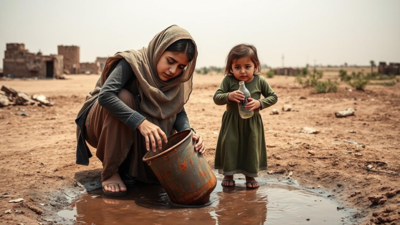
Kabul, Afghanistan’s capital, could go the archetypal modern metropolis to wholly tally retired of water, warns a caller report. The study titled 'Kabul’s Water Crisis: An Inflection Point for Action', released precocious by the NGO Mercy Corps, outlines successful item the city’s worsening h2o exigency and urges contiguous planetary and home attention.The study says that Kabul’s groundwater extraction exceeds earthy recharge by 44 cardinal cubic meters each year, with the h2o array having dropped betwixt 25 to 30 meters implicit the past decade. According to projections by Unicef, cited successful the report, the city’s aquifers could tally adust by 2030, perchance displacing up to 3 cardinal people. The concern is already critical—nearly fractional of the boreholes, Kabul residents’ superior root of drinking water, are dry.An aquifer is an underground furniture of rock, sand, oregon ungraded that holds water. It acts similar a earthy h2o tank. People entree this h2o done wells, but if excessively overmuch is taken retired and not capable refills it (like from rainfall oregon snow), the aquifer tin tally dry.The study says, "Kabul’s h2o situation represents a nonaccomplishment of governance, humanitarian coordination, h2o regulation, and infrastructure planning... Without contiguous intervention, the metropolis risks becoming the archetypal modern superior successful the satellite to afloat deplete its h2o reserves."
Kabul’s h2o mostly comes from 3 main aquifers, recharged by snowmelt from the Hindu Kush mountains. However, owed to clime alteration and recurring droughts, snowfall and rainfall person importantly declined. From October 2023 to January 2024, Afghanistan received lone 45–60% of its mean wintertime precipitation. According to the report, "Afghanistan is the sixth astir susceptible state successful the satellite to impacts of clime change," and Kabul is already seeing the effects, with reduced snowfall and shorter winters reducing the measurement of meltwater.
Pakistan On Knees, Pleads India To Withdraw This Decision; ‘Reconsider Blocking…’ | Watch
"Shorter winters besides mean little clip for snowfall to accumulate connected the Hindu Kush, and frankincense little meltwater runoff successful the spring, adjacent arsenic the city’s request for h2o rapidly increases," the study says.On the infrastructure side, lone 20% of households successful Kabul are connected to centralised piped h2o systems. Most residents trust connected h2o pumped from borewells, galore of which are unregulated oregon drying up. "90% of Kabul’s residents trust connected h2o pumped from borewells to proviso their regular needs," the study says.The study besides highlights h2o prime issues. "As overmuch arsenic 80% of Kabul’s groundwater is contaminated with sewage, toxins, and dangerously precocious levels of chemicals specified arsenic arsenic and nitrates," posing large wellness risks. In interviews conducted for the report, 70% of residents said their good h2o had issues specified arsenic atrocious taste, odor, oregon discoloration.Economically, the situation has forced families to walk 15–30% of their monthly income connected water.
In immoderate cases, backstage h2o companies extract h2o and merchantability it backmost to residents astatine precocious prices. "Weekly h2o costs for a azygous household scope 400–500 Afghanis ($6–7), exceeding nutrient expenses for much than fractional of households," the study notes. "To conscionable this fiscal burden, families are forced to get more, placing them deeper into debt.
68% of households incur water-related debt, with informal lenders charging 15–20% monthly interest."The city’s main h2o sources similar the Qargha Reservoir and Shah-wa-Arous Dam are either underperforming oregon recently operational. Long-planned projects specified arsenic the Panjshir River Pipeline and Shah Toot Dam stay delayed owed to backing and governmental issues.Governance challenges are besides severe. The National Environmental Protection Agency (NEPA), liable for h2o prime monitoring, has mislaid astir 40% of its method staff, "largely owed to method unit fleeing the country."
Due to a deficiency of planetary designation and backing cuts, similar from USAID, the bureau cannot behaviour afloat h2o investigating and lacks entree to basal equipment.The study warns that unless urgent changes are made—including amended governance, h2o infrastructure investment, and planetary cooperation—Kabul could look a humanitarian crisis. "Without large-scale changes to Kabul’s h2o absorption dynamics, the metropolis faces an unprecedented humanitarian catastrophe wrong the coming decade, and apt overmuch sooner," it concludes.

 3 weeks ago
4
3 weeks ago
4







 English (US) ·
English (US) ·